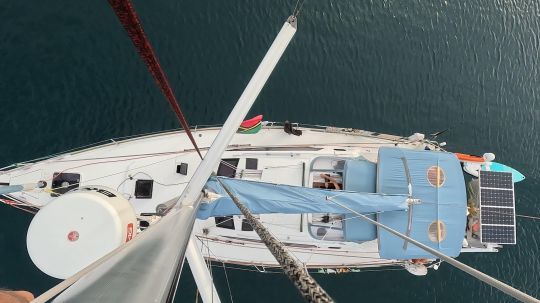Before you buy a boat, or if it's not economically feasible, embarking as a crew member is a good way to put your money where your mouth is. But it's a good idea to be aware of the good and bad points of the situation before coming aboard. Here's a sample.
Numerous advantages as a team member
- A new world to become a crew member on a boat is to enter a new world: a new boat, a new crew, a new destination... And this regular renewal is pretty exciting!
- Travel, discover and share if you're a crew member, you're sure to have a sense of discovery and sharing. Depending on your boat, you'll be able to go places you've never been before, and you may even have the chance to discover your captain's secret anchorages. Sailing brings together many enthusiasts, and you're bound to meet some great people and have some great discussions about this world. Sailors love to share their experiences, and you'll usually come away with a new set of skills after having been a crew member.

- A "no commitment" experience it's true that you'll be committing yourself for a certain period of time, such as a crossing. But once you've reached your destination, it's no longer your boat, and you don't have to worry about it. A boat is expensive to maintain and moor, and you may find yourself stranded due to weather or breakage. As a crew member, you're free to continue on your way without all these inconveniences, even if there's a moral obligation not to leave a crew in the lurch. Why not rent a car and explore the island on arrival? Leave on another boat? Go trekking for a few days? Anything is possible, and you won't have to think about your boat.
- A fine apprenticeship sailing on other people's boats is a great way to learn new techniques and perfect your sailing skills. Every skipper and crew has their own techniques and tricks. Don't forget to take notes, as this will save you a lot of time if you want to own your own boat later on. Many crew members catch the sailing bug.
- No (too much) responsibility ownership: owning your own ship involves a great deal of responsibility: cost, maintenance, mooring, safety of the ship, safety of the crew... As a crew member, you'll be responsible for keeping watch... but it's a whole different feeling. If something goes wrong, you know you can wake up the captain and he'll make a decision.

A team player's job not without its drawbacks
Being a team player may sound perfect, but there are also a few drawbacks:
- You're not the captain and it's best to remember that. You don't own the boat, so you'll never have the last word. Decisions on schedules, tasks, itinerary... are not yours to make. Of course, some captains are much more flexible than others. But on a boat, there's only one skipper, and as a crew member, you have to accept that. Many stories end badly because the crew member can't accept the skipper's decisions, or because a skipper abuses his "power". And on the open sea, things can quickly turn dramatic.
- Time to spare: Being a crew member means being subject to the vagaries of the weather. If a crossing is postponed for a week because of bad weather, you have to be able to adapt. So you need to have time on your hands, and be flexible.
- Tasks: On board a ship, you have to contribute to the daily tasks: maneuvering, watchkeeping, cooking, cleaning... This isn't really an inconvenience. But it can become one, if, for example, there are disagreements about washing-up or watch-keeping shifts. After a few days, when you live 24 hours a day in a small enclosed space, tensions can build up. It's up to you to communicate well and make an effort to keep the general atmosphere upbeat.

- The dashboard : The on-board fund depends on the skipper. Some won't charge you anything, because they're happy to have someone on board to help them. Some will charge you by the day, others will only split the cost of food...
- Relationships : This is the point that is most underestimated. Boating can put a strain on personal relationships. It's not uncommon for best friends to fall out during a sailing trip. The cocktail of fatigue, isolation and stress amplifies emotions. What's more, egos can come into play. Why did the captain reef the boat? It's so stupid! Why doesn't this crew member put the plates away where I told him to, on purpose? Tensions are building up, and the weather's not helping. To avoid this, you need to know yourself well, try to understand and respect others, put your ego aside when necessary and, above all, communicate well.
- Flexibility : As a crew member, you place all your trust in your skipper. He'll be in charge of the ship's safety, the program... If anything goes wrong, all final decisions are his. You need to be very flexible, because you are no longer 100% in control of your destiny. Choosing the right captain is not something to be taken lightly.
In conclusion, being a crew member can be an excellent opportunity to learn, discover and share. However, it does mean adapting to your skipper's schedule and showing flexibility. A good captain will also choose his crew well to avoid disillusionment. We advise you to communicate clearly between captain and crew before setting sail, so that everyone knows what to expect, and can make the most of the forthcoming cruises and stopovers.













